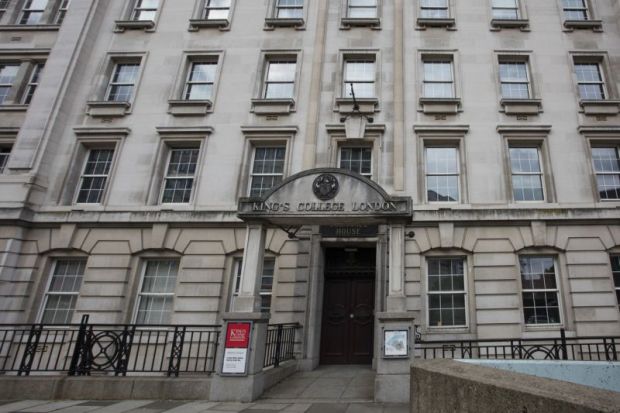The president of King’s College London will take a 30 per cent pay cut for six months, while its senior vice-principals and vice-principals will take a reduction in salary of 10 per cent.
The salary reductions will begin on 1 August, with the option to extend them for a further six, according to a document seen by Times Higher Education.
Ed Byrne, whose full remuneration stood at £350,000 in 2018-19, is the latest university leader to take a pay cut in the wake of the financial crisis caused by the coronavirus outbreak. Alice Gast, principal of Imperial College London, has agreed to a 20 per cent pay cut, for example.
In a statement sent to THE, the London School of Economics said the institution would “shortly announce a range of actions, including measures relating to senior leadership salaries, in response to the expected impact of Covid-19".
The principal and vice-chancellor of the University of Edinburgh, Peter Mathieson, is to take a 20 per cent pay cut as the university faces a “major financial impact” because of the coronavirus crisis, according to the Edinburgh Evening News.
The King's briefing message sent to staff explained that the institution would “not be unaffected by the additional costs of an extended shutdown and potential threats to student enrolments and research income”.
King’s said that it would be proposing a salary increase freeze for all staff across the institution for six months from 1 August 2020, with the option to extend for a further six, while the academic promotions process would also be frozen.
“We know this will be unwelcome news especially when so many of you are working hard but this is an action we are taking to help us to continue to protect staff employment,” the document said.
The briefing said that the university would only be furloughing employees funded from trading income, such as events and catering staff, as well as employees funded from non-public research grants and contracts, for example funded by industry or charities who have said they will not continue to pay, and research employees on fixed-term contracts due to end during the period of the scheme.
The institution will also reduce its operating capital budget, other than to support its network and student systems, and review any capital projects.
“By taking these additional actions we are helping to preserve our ability and capacity to be in a strong position to respond when activity returns to normal – as we currently expect for academic year 2021-22,” the document said.
Register to continue
Why register?
- Registration is free and only takes a moment
- Once registered, you can read 3 articles a month
- Sign up for our newsletter
Subscribe
Or subscribe for unlimited access to:
- Unlimited access to news, views, insights & reviews
- Digital editions
- Digital access to THE’s university and college rankings analysis
Already registered or a current subscriber? Login




